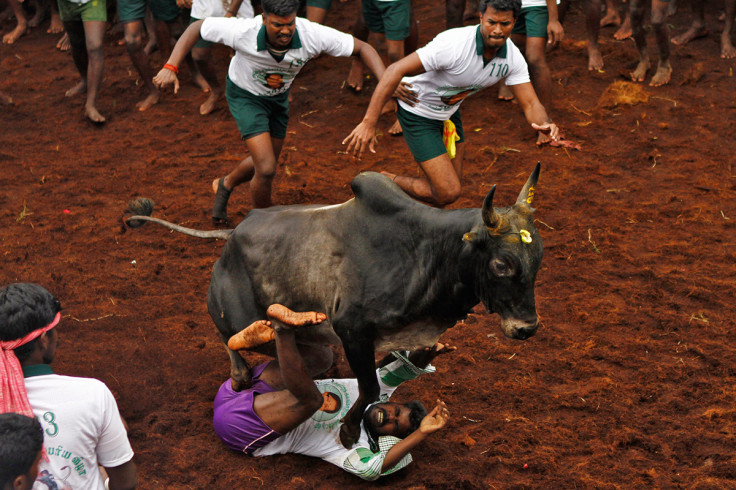India: Supreme Court issues stay order on Jallikattu bull taming sport

The Indian Supreme Court has ordered a stay on the south Indian bull-taming sport Jallikattu following a petition by animal welfare groups. One of the oldest bull taming sports in modern times, Jallikattu is part of the traditional celebrations of Pongal — the harvest celebrations held in Tamil Nadu, the southern state of India, which falls on 15 January this year.
A large group of muscular men pace back and forth, shouting out and whistling at the untamed bull bucking its way into the pen until one daring man breaks from the circle and takes hold of the bovine by its hump. He tries to get his hands on the prize — a bag of coins tied to the bull's horns — without letting go.
Many of those who attempt to master the raging bull end up with broken bones or injuries from the bull's horns. In some cases the untamed animal may thrash the man to death.
In 2011, the Congress government banned the sport along with bullock cart races following reports of animal abuse but the sport continued in Tamil Nadu where a state law managed to circumvent the central one. In 2014, the Supreme Court broke down the state law as well, putting an end to Jallikattu for the time.
However, on 7 January the current Narendra Modi-led Bharatiya Janta Party (BJP) government lifted the ban under the condition that restrictions be put in place to prevent animal cruelty. Animal rights groups including the Animal Welfare Board of India and Peta then petitioned the apex court to put a hold on the games.
"Before being sent to the arena, they (bulls) are provoked, tortured, threatened, starved, administered alcohol and inflicted with pain to make them violent and anguished," Compassion Unlimited Plus Action (Cupa), a non-profit organisation, said in its petition to the Supreme Court.
"As a result of these events, the bull suffers from severe forms of physical and mental injuries and even death," it said.
Animal rights activist Dr Chinny Krishna, vice chairman of the Animal Welfare Board of India explained that the court had banned the sport only after "seeing voluminous evidence of all forms of cruelty". He mentioned how the animals were goaded by "pulling them by tail, intoxicating them, beating them" and "applying chilli powder on their genitals".
Local politicians are keen for the games to restart since their efforts to lift the ban will not go unnoticed at the time of elections. "So even if the Supreme Court stays this, later the BJP could claim that we did our bit but the courts stopped," GC Shekar, associate editor of The Telegraph said.
© Copyright IBTimes 2025. All rights reserved.






















